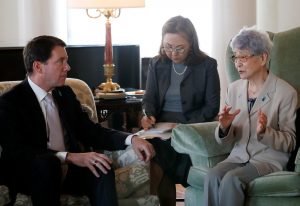
By Lesley Wroughton and Patricia Zengerle
WASHINGTON (Reuters) – The United States imposed major sanctions on Friday against 24 Russians, striking at allies of President Vladimir Putin in one of Washington’s most aggressive moves to punish Moscow for what it called a range of “malign activity,” including alleged meddling in the 2016 U.S. election.
The action, taken under pressure from the U.S. Congress, freezes the U.S. assets of “oligarchs” such as aluminum tycoon Oleg Deripaska, a close associate of Putin, and lawmaker Suleiman Kerimov, whose family controls Russia’s largest gold producer, Polyus.
The sanctions are largely a reply to what U.S. intelligence agencies say was Russian interference in the presidential election, although the Treasury Department painted them as a response to a series of adversarial actions by Moscow.
U.S. President Donald Trump has been under fire for not taking strong action against Russia after a series of diplomatic disputes reminiscent of the Cold War era and the sanctions could complicate his hopes for good relations with Putin.
The sanctions are aimed at seven Russian oligarchs and 12 companies they own or control, plus 17 senior Russian government officials. They freeze the U.S. assets of the people and companies named and forbid Americans in general from doing business with them.
Russian Security Council Secretary Nikolai Patrushev said, however, Moscow’s contacts with the U.S. government would not be brought to an end by the sanctions. Russia denies interfering in the U.S. election.
They could hurt the Russian economy, especially the aluminum, financial and energy sectors, and are a clear message to Putin and his inner circle of U.S. displeasure.
In announcing the sanctions, Treasury Secretary Steve Mnuchin said in a statement, “The Russian government operates for the disproportionate benefit of oligarchs and government elites.”
He said Moscow “engages in a range of malign activity around the globe, including continuing to occupy Crimea and instigate violence in eastern Ukraine, supplying the Assad regime with material and weaponry as they bomb their own civilians, attempting to subvert Western democracies, and malicious cyber activities.”
Shares in Russian aluminum producer Rusal were down 2.2 percent on Moscow’s exchange after the company was named on the sanctions list.
Russian state companies under the U.S. sanctions will receive additional government support, Russian Industry and Trade Minister Denis Manturov said, according to Interfax.
MUELLER INVESTIGATION
U.S. intelligence agencies last year accused Russia of using hacking and disseminating false information and propaganda to disrupt the 2016 elections and eventually try to ensure Trump defeated Democratic candidate Hillary Clinton.
Special Counsel Robert Mueller is investigating whether Trump’s election campaign colluded with Russia, something that Trump denies. Mueller has indicted 13 Russians and three organizations in his probe.
Elizabeth Rosenberg, a former senior U.S. Treasury Department official who is now a senior fellow at the Center for a New American Security think tank, said the sanctions were significant, although there is more to do.
“I’m impressed by how aggressive this is,” she said. “I thought it would be serious and this is certainly a very serious statement of U.S. policy.
“I would hasten to say that Russia hawks may welcome this but wouldn’t find it satisfying. And by no means would this be the sum total of what the U.S. government should do to advance its concerns.”
Trump has faced fierce criticism – including from fellow Republicans – for doing too little to punish Russia for the election meddling, aggression in Ukraine, and support of President Bashar al-Assad in Syria’s civil war.
He angered many members of Congress by failing for months to implement sanctions on Russia that lawmakers passed nearly unanimously last year.
But pressure for the United States to take action against Russia, especially from U.S. lawmakers, has been increasing.
Putin’s government has been blamed for the poisoning of a former Russian double agent living in Britain last month and the United States and several European states announced plans to expel more than 100 Russian diplomats in response.
In February, the White House blamed Russia for the international “NotPetya” cyber attack, which has been called the most destructive and costly in history.
On March 15, the Trump administration said it would impose sanctions on 19 people and five entities, including Russian intelligence services, for cyber attacks stretching back at least two years.
Friday’s sanctions were authorized by the Countering America’s Adversaries Through Sanctions Act, known as CAATSA, which Trump reluctantly signed into law in August.
Chris Painter, the former top cyber diplomat at the U.S. State Department, said the latest sanctions are unlikely to deter the Kremlin unless Trump formally condemns Putin.
Painter, who left government last year, criticized Trump’s rhetoric toward Putin – including a congratulatory call last month when Putin won another presidential term in a widely criticized election.
“We need the head of our country saying, ‘This is not going to happen,'” Painter said. “That’s a critical piece.”
(Reporting by Lesley Wroughton and Patricia Zengerle; Additional reporting by Doina Chiacu, Tim Ahmann and Susan Heavey; Writing by Alistair Bell; Editing by Yara Bayoumy and Bill Trott)











